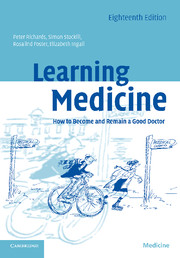Book contents
- Frontmatter
- Contents
- Foreword
- Preface
- 1 Why medicine and why not?
- 2 Opportunity and reality
- 3 Requirements for entry
- 4 Choosing a medical school
- 5 Application and selection
- 6 Interviews
- 7 Medical school: the early years
- 8 Medical school: the later years
- 9 Doubts
- 10 The new doctor
- 11 Developing your career
- 12 Career opportunities
- 13 Privileges and responsibilities: avoiding the pitfalls
- Postscript
- Appendices
- Index
13 - Privileges and responsibilities: avoiding the pitfalls
Published online by Cambridge University Press: 02 December 2009
- Frontmatter
- Contents
- Foreword
- Preface
- 1 Why medicine and why not?
- 2 Opportunity and reality
- 3 Requirements for entry
- 4 Choosing a medical school
- 5 Application and selection
- 6 Interviews
- 7 Medical school: the early years
- 8 Medical school: the later years
- 9 Doubts
- 10 The new doctor
- 11 Developing your career
- 12 Career opportunities
- 13 Privileges and responsibilities: avoiding the pitfalls
- Postscript
- Appendices
- Index
Summary
The public is entitled to high professional standards from doctors and it is a privilege to be a doctor. But privileges carry obligations. From the first day that you have contact with patients as a medical student, you carry a personal responsibility and you will be individually accountable. You need to consider carefully whether you are prepared to pay that price, now and for the rest of your professional life.
Paragraph 1 of Good Medical Practice published in November 2006 states
Patients need good doctors. Good doctors make the care of their patients their first concern; they are competent, keep their knowledge and skills up to date, establish and maintain good relationships with patients and colleagues, are honest and trustworthy and act with integrity.
It is, of course, purely coincidental that legal issues and the pitfalls of practice are raised in Chapter 13 but the likelihood is that sooner or later, rightly or wrongly, each one of us will be faced with a complaint. This may emanate from a patient, a relative of a patient, an employer, a colleague or from another health professional. Patients have high expectations and you will be much better employed caring for them than dealing with lawyers.
Before making a life choice as to whether medicine is right for you and you are right for medicine, you need to consider whether you have the necessary temperament and resilience to deal with death and disappointment as well as the huge rewards of medicine and also with complaints. It is worth spending time now thinking about some of the less savoury aspects of medical practice and also considering whether there is anything you can do to avoid complaints or to mitigate the consequences to patients and their families and also to yourself.
Information
- Type
- Chapter
- Information
- Learning MedicineHow to Become and Remain a Good Doctor, pp. 175 - 210Publisher: Cambridge University PressPrint publication year: 2007
